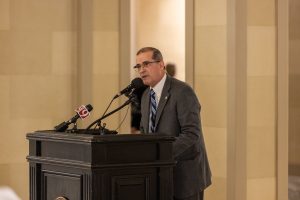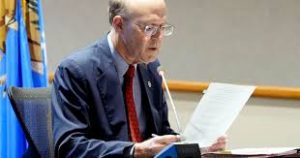Oklahoma Attorney General Gentner Drummond called for an audit of spending by former Oklahoma Education State Superintendent Ryan Walters following his department, but at the same time has come out publicly defending a one-page audit of billions of dollars in bonds following the 2021 Winter Storm Yuri that hit the state four years ago.
In his announcement last week, Drummond, a candidate for Governor, ordered an Investigative Audit in a letter to Cindy Byrd, Oklahoma State Auditor and Inspector, stating, “Now that former State Superintendent Ryan Walters has formally resigned, a number of current and previous OSDE staff have raised credible concerns about the spending practices under his leadership.”
His letter to Byrd came one day after his office filed a response in the State Supreme Court to the challenge filed in February by Rep. Tom Gann of a $119.5 million rate hike approved by Corporation Commissioners for Public Service Company and of the bond securitization used to cover billions of dollars in 2021 winter storm costs that hit PSO, OGE,ONG and Summit. Or as one critic described the filing, “the shroud has been lifted.”

In a further filing in August, Gann initially challenged the use of a one-page audit of the billions of dollars in winter storm bond costs approved by Corporation Commissioners on a 2-1 vote. He also argued the Supreme Court should invalidate some $700 million in ratepayer-backed bonds issued to cover PSO’s storm costs. The payments for the bonds have been collected since September 2022 and will continue for another 17 years.
Further, Rep. Gann charged the Corporation Commission failed to carry out a required audit of the bonds in PSO’s most recent rate case. He contended the utility’s original 2021 Uri costs securitized into the bonds were never properly audited.
The legislator said the “lawful interpretation of the word “audit” is essential to proper implementation of the provisions” of the state law passed by the legislature immediately following the storm. The Attorney General argues differently. Gann argued the $3 billion in storm costs were securitized into ratepayer-backed bonds at a total cost of some $5 billion to more than a million customers of OG&E, ONG, PSO and Summit. The total is closer to 1.6 million customers of the utilities.
“74 O.S. 9078 requires an “audit” of those bonds,” he argued. But Attorney General Drummond, in a Sept. 30 filing, defended the use of the one-page audit of the bonds and further charged that Rep. Gann did not have “standing to appeal the purely legislative Commission proceeding” and “failed to show that he is an “aggrieved party” whose injuries may be redressed by a reversal of the final order.
In his filing, the Attorney General defended the utility in question while the title of the actual bill that became law in 2021 was named “February 2021 Regulated Utility Consumer Protection Act.” Gann contends he is the one defending consumers, not the Attorney General.
The Attorney General’s filing also defended Corporation Commissioner Todd Hiett’s participation in the votes, stating that it did not violate Gann’s “due process rights” because the “legislative nature of rate cases does not afford due process to the litigants involved, absent a showing of unfair or confiscatory rates.” Drummond’s filing stated “Commissioner Hiett’s involvement in the commission proceeding did not violate PSO’s customers’ due process rights.” While Gann charged Hiett’s participation violated state ethics rules because of sexual claims and drunkenness allegations made against him, the Attorney General claimed that rate cases in “legislative procedings” and “litigants are not entitled to due process in such legislative proceedings.”
“In any event, Appellant cannot show that his due process rights were violated and that reversal of the Commission’s Final Order is proper because Commissioner Hiett allegedly violated state ethics rules.”
The filing also contended, “Speculative anecdotes of alleged personal impropriety on behalf of a commissioner, without concrete allegations of any conduct resulting in unfair rates, do not arise to a due process violation.”
While the Corporation Commission hearings and meetings are presented in a court-like manner and witnesses are “sworn in” to offer testimony, the Attorney General contends it is not a judicial body and its proceedings are legislative in nature. Thus, he declared, “Parties to legislative rate cases are not entitled to due process.” And the Corporation Commissioners are “not required to comply with the judicial standards of conduct.”
Drummond previously defended the bond securitization before the Supreme Court and also suggested charges would be filed against former Corporation Commissioner Bob Anthony who initiated his own investigation into the discrepancy of the one-page audit.

Anthony was the lone Corporation Commissioner who voted against the securitization approval for the utilities in question and raised the issue of whether a “one-page audit” fit the definition of a real audit of the billions of dollars in costs.
Before being term-limited and replaced by Brian Bingman on the commission, Anthony attempted to present testimony about the need for an audit as defined under state law. But Drummond’s filing contended, “The Securitization Act does not incorporate the definition of an audit found in the Oklahoma Accountancy Act.” The Attorney General noted the Corporation Commission, in April 2021, approved “after a thorough review,” PSO’s incurred costs and determined the utility was eligible to recover $688 million in 2021 Winter Weather Event related costs….through securitization.
The Attorney General repeated his contention that Gann, a Republican Representative from Inola, “has not argued that he has been discretely injured” by the Corporation Commission’s final order in support of PSO.
“Appellant has not demonstrated any cognizable injury from Commission’s Final Order, nor has he shown that a reversal would yield fairer or more reasonable rates,” stated the AG’s filing.
The Attorney General, in defending the Corporation Commission and PSO, further declared the one-page audit was proper and legal. He argued the legislature, in crafting the Regulated Utility Consumer Protection Act, did not contemplate that the term “audit” would assume the definition set forth in the Accountancy Act because the legislature “uniquely” defined the term audit “for purposes of rate-case review and that “generally accepted auditing standards” are not required to perform the “audit” as defined in section 9078 of the new law.
‘In sum, a plain reading of section 9078 reveals that the Legislature expressed its intent to create a straightforward, limited “audit” in rate case,” argued the Attorney General. The filing further claimed there is a “stark difference” between the American Institute of Certified Public Accountants standards and what section 9078 of the law certifies.
“Clearly, the Legislature intended for the mandatory rate case “audits” to function distinctly from other well-defined audits that demand more oversight, processes, and licensing.”
Gann’s full Brief in Chief can be read online here:
https://www.oscn.net/dockets/GetDocument.aspx?ct=appellate&bc=1062686746&cn=CU-122861&fmt=pdf
PSO, the OCC and the Attorney General’s Office have 40 days to respond.
The progress of all the appeals can be followed on the Oklahoma Supreme Court website:
PSO rate case:
https://www.oscn.net/dockets/GetCaseInformation.aspx?db=appellate&number=122861
ONG, PSO & OG&E CY2023 fuel cases:
https://oscn.net/dockets/GetCaseInformation.aspx?db=appellate&number=122991
OG&E rate case:
https://oscn.net/dockets/GetCaseInformation.aspx?db=appellate&number=123021
ONG rate case:
https://oscn.net/dockets/GetCaseInformation.aspx?db=appellate&number=123348

